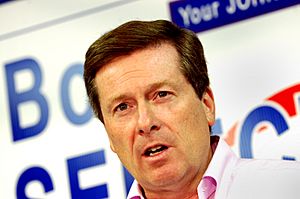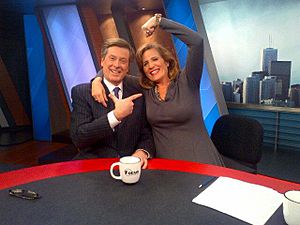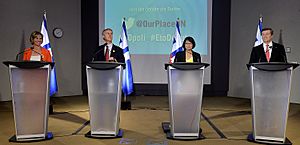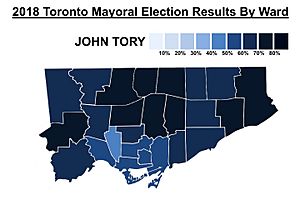John Tory facts for kids
Quick facts for kids
John Tory
OOnt KC
|
|||||||||||||||||||||||||||||
|---|---|---|---|---|---|---|---|---|---|---|---|---|---|---|---|---|---|---|---|---|---|---|---|---|---|---|---|---|---|
Tory in 2018
|
|||||||||||||||||||||||||||||
| 65th Mayor of Toronto | |||||||||||||||||||||||||||||
| In office December 1, 2014 – February 17, 2023 |
|||||||||||||||||||||||||||||
| Deputy |
|
||||||||||||||||||||||||||||
| Preceded by | Rob Ford | ||||||||||||||||||||||||||||
| Succeeded by | Olivia Chow | ||||||||||||||||||||||||||||
|
|||||||||||||||||||||||||||||
| Personal details | |||||||||||||||||||||||||||||
| Born |
John Howard Tory
May 28, 1954 Toronto, Ontario, Canada |
||||||||||||||||||||||||||||
| Political party | Independent | ||||||||||||||||||||||||||||
| Other political affiliations |
Ontario Progressive Conservative (provincial) Progressive Conservative (federal, until 1995) |
||||||||||||||||||||||||||||
| Spouse |
Barbara Hackett
(m. 1978) |
||||||||||||||||||||||||||||
| Children | 4 | ||||||||||||||||||||||||||||
| Parents |
|
||||||||||||||||||||||||||||
| Relatives | John S. D. Tory (grandfather) James Marshall Tory (uncle) |
||||||||||||||||||||||||||||
| Residences | Toronto, Ontario | ||||||||||||||||||||||||||||
| Alma mater | University of Toronto (BA) Osgoode Hall Law School (LLB) |
||||||||||||||||||||||||||||
| Occupation |
|
||||||||||||||||||||||||||||
John Howard Tory (born May 28, 1954) is a Canadian lawyer, broadcaster, and businessman. He was the 65th mayor of Toronto from 2014 to 2023. Before that, he was the leader of the Progressive Conservative Party of Ontario from 2004 to 2009. He also served as the leader of the Official Opposition in Ontario from 2005 to 2007.
After working as a lawyer and in business, Tory ran for mayor of Toronto in 2003 but did not win. He then became the leader of the Ontario Progressive Conservative Party. He was a member of the Legislative Assembly of Ontario from 2005 to 2007. After leaving politics in 2009, Tory hosted a radio talk show. He also led a non-profit group called CivicAction from 2010 to 2014.
On October 27, 2014, Tory was elected mayor of Toronto. He won against Doug Ford Jr. and Olivia Chow. He was re-elected in 2018 and again in 2022 for a third term. On February 10, 2023, he announced he would step down as mayor due to a personal matter. He officially left office on February 17, 2023. Olivia Chow became the next mayor of Toronto.
Contents
- Early Life and Education
- Career in Business and Politics
- Leading the Ontario PC Party
- Return to Broadcasting
- Mayor of Toronto (2014–2023)
- After Being Mayor
- Personal Life
- Honours and Awards
- Election Results
- External Links
- See also
Early Life and Education
John Howard Tory was born in Toronto, Ontario, on May 28, 1954. He is the oldest of four children. His mother was Elizabeth Bacon, and his father was John A. Tory, a business leader. His grandfather, John S. D. Tory, was a lawyer.
He went to the University of Toronto Schools, which was a public high school. In 1975, he earned a Bachelor of Arts degree in political science from Trinity College at the University of Toronto. In 1978, he received his law degree from Osgoode Hall Law School at York University. He became a lawyer in Ontario in 1980.
Career in Business and Politics
From 1972 to 1979, John Tory worked as a journalist for Rogers Broadcasting radio stations. Later, from 1980 to 1995, he held various roles at a law firm called Tory, Tory, DesLauriers & Binnington.
From 1981 to 1985, Tory worked for Bill Davis, who was the premier of Ontario at the time. He was a main advisor to the premier. After Davis retired, Tory became a special advisor on acid rain for the Canadian government.
Tory also helped with political campaigns for former Prime Minister Brian Mulroney and his successor, Kim Campbell.
From 1995 to 1999, he returned to Rogers Communications as the president and CEO of Rogers Media. This company owned many radio and television stations, magazines, and newspapers. In 1999, he became president and CEO of Rogers Cable. He helped the company grow during a time of big changes in the cable industry. He also served as the ninth commissioner of the Canadian Football League from 1996 to 2000.
First Mayoral Campaign in 2003
After supporting Toronto Mayor Mel Lastman for six years, Tory decided to run for mayor himself in the 2003 Toronto municipal election. He came in second place, losing to David Miller. Other candidates included Barbara Hall and John Nunziata.
Tory and Miller both started with little public recognition. Miller gained support from progressive voters, while Tory appealed to more conservative voters. Tory received support from the Toronto Police Association. After the election, Tory helped Miller and Hall raise money to pay off their campaign debts.
Leading the Ontario PC Party
In March 2004, John Tory showed interest in becoming the leader of the Progressive Conservative Party of Ontario. The leadership election was set for September 18, 2004. Tory officially announced his candidacy on May 6, 2004. He won the support of many former provincial ministers and members of Provincial Parliament (MPPs).
Tory won the leadership election, defeating Jim Flaherty on the second ballot. When Flaherty later moved to federal politics, Tory supported him.
In January 2005, Tory ran for a seat in the provincial legislature. He won the by-election in Dufferin—Peel—Wellington—Grey on March 17, 2005. Former premier Bill Davis attended Tory's first session in the legislature as PC leader.
2007 Provincial Election
In the 2007 provincial election, Tory ran in Don Valley West in Toronto, where he grew up.
Tory released his election plan on June 9, 2007. It included promises to remove a health care tax, address the doctor shortage, and invest in public transit. His campaign faced challenges due to a proposal about school funding.
On election night, the Progressive Conservatives gained a few seats but remained the Official Opposition. Dalton McGuinty's Liberals were re-elected with a majority. Tory lost his own riding of Don Valley West to Kathleen Wynne. Despite the loss, Tory said he would stay on as leader.
Leading from Outside the Legislature
After the election loss, the party held a leadership review vote in 2008. Tory received 66.9 percent support. He announced he would stay on as leader, but faced criticism from some party members.
Throughout 2008, Tory's leadership was seen as uncertain because he did not have a seat in the legislature. Some party members called for him to resign. In January 2009, MPP Laurie Scott resigned her seat, allowing Tory to run in a by-election in Haliburton—Kawartha Lakes—Brock. However, on March 5, 2009, he lost the by-election to the Liberal candidate.
The next day, Tory announced his resignation as party leader. Bob Runciman became the interim leader. Tim Hudak later won the leadership election to become the new party leader.
Return to Broadcasting
After leaving provincial politics, John Tory returned to broadcasting. He hosted a phone-in show on Toronto radio station CFRB. In the fall of 2009, he moved to a weekday afternoon show called Live Drive.
Tory considered running for mayor of Toronto again in 2010. However, he decided not to run to continue his radio show and lead the Toronto City Summit Alliance. His last radio broadcast was on February 21, 2014, when he announced his candidacy for mayor.
Mayor of Toronto (2014–2023)
Mayoral Elections
Tory officially became a candidate for the 2014 Toronto mayoral election on February 24, 2014. He said that building a new transit line, a Yonge Street relief line, would be his top priority. He also proposed a plan called SmartTrack, which would use existing train tracks for a new "surface subway" service. On October 27, 2014, Tory was elected mayor of Toronto.
He became mayor on December 1, 2014. He met with Premier Kathleen Wynne to discuss working together. He also named Councillor Denzil Minnan-Wong as his deputy mayor. Later, Councillor Jennifer McKelvie became deputy mayor for his third term.
On May 1, 2018, Tory registered to run for re-election in the 2018 Toronto mayoral election. He had high approval ratings and was a strong front-runner. He was re-elected mayor on October 22, 2018, winning with 63.49% of the vote.
Tory was re-elected for a third term in 2022, defeating Gil Penalosa with 62% of the vote.
Community Safety and Policing
Tory was a member of the Toronto Police Services Board (TPSB) since becoming mayor in 2014. This board oversees the Toronto Police Service (TPS), hiring the police chief and approving the budget.
Police Practices
After the 2014 election, the TPSB changed rules about "carding," a practice where police could stop people and ask for their information. Many people felt this practice unfairly targeted Black individuals. Tory initially defended the policy but later called for it to end, saying it was "illegitimate, disrespectful and hurtful." In 2017, the province effectively ended carding across Ontario.
Police Reform Efforts
In June 2020, following calls for police reform, some city councillors proposed cutting the Toronto police budget. Tory and most of the council rejected this idea. Instead, they supported motions to create a non-police crisis response program and increase funding for police body cameras. Tory believed a budget reduction might happen if the new program was successful.
During his time as mayor, Tory focused on increasing police resources. This sometimes meant less money for social services and housing.
Toronto Community Crisis Service
In June 2020, Toronto City Council discussed ways to reform policing. Tory proposed exploring "alternative models of community safety response" for situations without violence or weapons. This would mean other services would handle some duties currently done by police. He also suggested that future budgets should prioritize social supports.
In January 2022, the city approved a plan for a pilot program for this new service. Tory stated that the goal was to expand it city-wide by 2025. The Toronto Community Crisis Service pilot program launched in March 2022.
TTC Safety
In 2022 and 2023, there were several violent incidents on Toronto's transit system (TTC). Union leaders and passenger groups asked the city to take action. They called for more mental health programs, social services, and security. In January 2023, Tory announced that 80 additional police officers would patrol the transit system. The TTC also added 20 outreach workers for homeless people and 50 security guards.
Transportation Initiatives
SmartTrack Transit Plan
In his 2014 campaign, Tory proposed SmartTrack, a plan to use existing GO Transit rail lines for a new "surface subway." This service would have 22 stations and run alongside GO trains. Tory initially estimated the cost at $8 billion, with the city paying $2.5 billion. He hoped it would be finished in seven years.
After he became mayor, the SmartTrack plans changed. Some stations were moved or removed, and questions arose about costs. The current plan involves building five new transit stations by 2026, costing the city $1.463 billion.
Scarborough Subway Extension
Tory supported a one-stop extension of Toronto subway Line 2 to the Scarborough Town Centre. This was different from a previous three-stop plan. The Scarborough Subway Extension is in the detailed design stage, with an estimated operation date of 2023.
Gardiner Expressway
In 2016, the city council had to decide the future of the elevated Gardiner Expressway east of Jarvis Street. Tory supported a "hybrid option" to rebuild the structure, costing about $1 billion. He said this would help traffic. Others, including former mayor David Crombie, wanted to tear it down instead.
Road Tolls Discussion
In 2003, Tory was against road tolls. As mayor in 2016, his view changed when the city needed more money for transit. In November 2016, Tory supported tolls on the Gardiner Expressway and Don Valley Parkway. This could have raised about $200 million each year. The city council approved the idea, but the provincial government had to give permission.
In January 2017, the provincial government rejected the idea. Premier Wynne said they would not approve tolls until there were better transit options for commuters. Instead, the province increased the city's share of the gas tax. Tory was grateful for the gas tax increase but criticized the province for denying the tolls. In 2022, Tory again suggested road tolls, but the provincial government under Premier Doug Ford rejected the idea once more.
Housing Initiatives
In 2014, Tory chose Councillor Ana Bailão to lead the affordable housing committee.
Modular Housing Program
In September 2020, during the COVID-19 pandemic, the city started a housing plan to build 1000 units of modular housing. This program uses city-owned land to place these ready-made homes. It is part of Toronto's overall housing strategy.
Toronto Seniors Housing Corporation
In 2021, the city created the Toronto Seniors Housing Corporation. This organization provides housing for 15,000 low and moderate-income seniors in 83 buildings that used to be part of Toronto Community Housing Corporation.
ModernTO Initiative
The ModernTO initiative, started in 2019, aims to make the city's office spaces more efficient. In April 2022, Toronto City Council adopted the plan to redevelop several city-owned properties into affordable housing. The city plans to reduce its office buildings from 55 to 15. Eight buildings will be turned into 500 to 600 affordable housing units.
2023 Housing Action Plan
After the 2022 election, Tory proposed new ideas to change the city's housing strategy. These ideas included ending "exclusionary zoning," which would allow more types of housing like laneway suites. It also aimed to speed up building approvals and encourage rental housing construction. The plan also suggested that the province allow the city to create a "use it or lose it" policy for developers who hold onto approved but undeveloped land.
The proposal was praised by housing groups. However, some councillors worried it would change the look of neighborhoods with detached homes.
Parks and Recreation
Rail Deck Park Proposal
In August 2016, Tory proposed building a 21-acre park in downtown Toronto above the Railway Lands. This park would be located between the Rogers Centre and Bathurst Street. The estimated cost was $1.66 billion.
The plan depended on the city getting air rights (the right to build above the land) from the railway companies. A group of private developers claimed they already owned these rights. The city council tried to re-zone the area for park use only. In May 2021, a tribunal ruled in favor of the developers, which effectively ended the city's original park plans. Tory said he was "deeply disappointed" by the ruling. The development group now plans to build a smaller park as part of a larger project with condo and office towers.
COVID-19 Pandemic Response
On March 23, 2020, Tory declared a state of emergency in Toronto due to the COVID-19 pandemic. This happened after Ontario Premier Doug Ford declared a province-wide emergency. The city cancelled major events and festivals until June 30.
Starting in July 2020, rules for street parking and transit fare enforcement returned. From July 2, 2020, face masks were required on the TTC. After July 7, masks were required in enclosed public places.
Strong-Mayor Powers
Before the 2022 election, the provincial government introduced new laws that gave Tory more powers as mayor. These powers included developing the city budget, creating council committees, and appointing department heads. Tory also gained the power to veto council decisions that did not match provincial priorities. In November 2022, the province proposed even more changes, which would allow some bylaws to pass with only one-third of council votes if Tory declared them aligned with provincial goals.
Tory stated that people often complained about housing and safety, but not about the new powers. The Ford government said the mayor's city-wide mandate justified these changes. However, Toronto City Council was not consulted and condemned the new laws. All five living former Toronto mayors wrote a letter calling the new powers an "attack" on local democracy. Critics urged Tory to reject some of these new powers. In December 2022, Tory asked the provincial government to add a sunset clause, meaning the powers would end after his term in 2026.
Taxes
Tory promised to keep property tax increases at or below the rate of inflation. He had made this promise in previous elections and kept it during his time as mayor.
Resignation from Mayoralty
On February 10, 2023, John Tory announced he would resign as Mayor of Toronto. He stated he would work with Deputy Mayor Jennifer McKelvie and city officials to ensure a smooth transition. He submitted his resignation letter on February 16, with his last day being February 17 at 5 p.m. After his departure, McKelvie took on some mayoral duties until a mayoral by-election could be held. Former NDP MP Olivia Chow was elected to succeed Tory as mayor.
After Being Mayor
In December 2023, several months after resigning, Tory joined Bell Media as a commentator on municipal affairs. He appears on CFRB radio and on CTV News and CP24 television. In March 2024, it was announced that Tory would rejoin the board of directors for Rogers, a company he had worked for before.
Personal Life
John Tory married Barbara Hackett in 1978. She is a home builder and renovator. They met in 1976 while studying law at York University. They have four children.
Tory has two brothers, Michael and Jeffrey, and one sister, Jennifer. One of his ancestors, James Tory, was a soldier who settled in Nova Scotia in the 1780s. His maternal grandmother, Helen Yvonne Solomon, was from a Russian Jewish family that moved to Canada in the early 1900s.
Honours and Awards
In 2012, Tory became a member of the Order of Ontario. This award recognized him for being a "champion for the Greater Toronto Region" through his work with CivicAction and various fundraising campaigns. He also received the Queen Elizabeth II Diamond Jubilee Medal and holds a commission as King's Counsel. In 2011, Tory received a Harry Jerome Award for his work as co-chair of DiverseCity.
Election Results
| Candidate | Votes | % |
|---|---|---|
| John Tory | 342,158 | 62.00 |
| Gil Penalosa | 98,525 | 17.85 |
| Chloe-Marie Brown | 34,821 | 6.31 |
| Blake Acton | 8893 | 1.61 |
| 27 other candidates | 67,493 | 12.22 |
| Total | 551,890 | 100.00 |
| Candidate | Votes | % |
|---|---|---|
| John Tory | 479,659 | 63.49 |
| Jennifer Keesmaat | 178,193 | 23.59 |
| Faith Goldy | 25,667 | 3.40 |
| Saron Gebresellasi | 15,222 | 2.01 |
| 64 other candidates | 56,752 | 7.51 |
| Total | 755,493 | 100.00 |
| Candidate | Votes | % |
|---|---|---|
| John Tory | 394,775 | 40.28 |
| Doug Ford | 330,610 | 33.73 |
| Olivia Chow | 226,879 | 23.15 |
| 64 other candidates | 27,913 | 2.84 |
| Total | 980,177 | 100.00 |
| Ontario provincial by-election, Haliburton—Kawartha Lakes—Brock March 5, 2009 due to resignation of Laurie Scott | ||||||||
|---|---|---|---|---|---|---|---|---|
| Party | Candidate | Votes | % | ±% | ||||
| Liberal | Rick Johnson | 15,542 | 43.88 | +14.37 | ||||
| Progressive Conservative | John Tory | 14,595 | 41.20 | -8.79 | ||||
| Green | Mike Schreiner | 2,330 | 6.58 | -0.58 | ||||
| New Democratic | Lyn Edwards | 2,112 | 5.96 | -5.95 | ||||
| Independent | Jason Taylor | 280 | 0.79 | |||||
| Family Coalition | Jake Pothaar | 258 | 0.73 | +0.11 | ||||
| Freedom | Bill Denby | 140 | 0.40 | -0.41 | ||||
| Independent | John Turmel | 94 | 0.27 | |||||
| Libertarian | Paolo Fabrizio | 72 | 0.20 | |||||
| Total valid votes | 35,423 | 100.00 | ||||||
| Liberal gain from Progressive Conservative | Swing | +11.58 | ||||||
| Source: Elections Ontario | ||||||||
| 2007 Ontario general election: Don Valley West | |||||
|---|---|---|---|---|---|
| Party | Candidate | Votes | % | ±% | |
| Liberal | Kathleen Wynne | 23,059 | 50.4 | - | |
| Progressive Conservative | John Tory | 18,136 | 39.7 | - | |
| Green | Adrian Walker | 2,202 | 4.8 | - | |
| New Democratic | Mike Kenny | 2,135 | 4.7 | - | |
| Family Coalition | Daniel Kidd | 183 | 0.4 | - | |
| Dufferin—Peel—Wellington—Grey by-election, March 17, 2005 resignation of Ernie Eves |
|||||
|---|---|---|---|---|---|
| Party | Candidate | Votes | % | ±% | |
| Progressive Conservative | John Tory | 15,610 | 56.3 | ||
| Liberal | Bob Duncanson | 4,625 | 16.7 | ||
| New Democratic | Lynda McDougall | 3,881 | 14.0 | ||
| Green | Frank de Jong | 2,767 | 10.0 | ||
| Family Coalition | Paul Micelli | 479 | 1.7 | ||
| Independent | William Cook | 163 | 0.6 | ||
| Libertarian | Philip Bender | 135 | 0.5 | ||
| Independent | John Turmel | 85 | 0.3 | ||
| Toronto municipal election, 2003: Mayor of Toronto | ||||||||
|---|---|---|---|---|---|---|---|---|
| Party | Candidate | Votes | % | |||||
| David Miller | 299,385 | 43.26 | ||||||
| John Tory | 263,189 | 38.03 | ||||||
| Barbara Hall | 63,751 | 9.21 | ||||||
| John Nunziata | 36,021 | 5.20 | ||||||
| Tom Jakobek | 5,277 | 0.76 | ||||||
| 39 other candidates | 24,462 | 3.53 | ||||||
| Total valid votes | 692,085 | 100.00 | ||||||
For full results, see Results of the 2003 Toronto election.
External Links
- City of Toronto: About Mayor John Tory
- Legislative Assembly of Ontario profile
- Law Society of Upper Canada Record
- John Tory - 2014 Toronto Mayoral Collection - Web archive created by the University of Toronto Libraries
See also
 In Spanish: John Tory para niños
In Spanish: John Tory para niños
 | James B. Knighten |
 | Azellia White |
 | Willa Brown |


